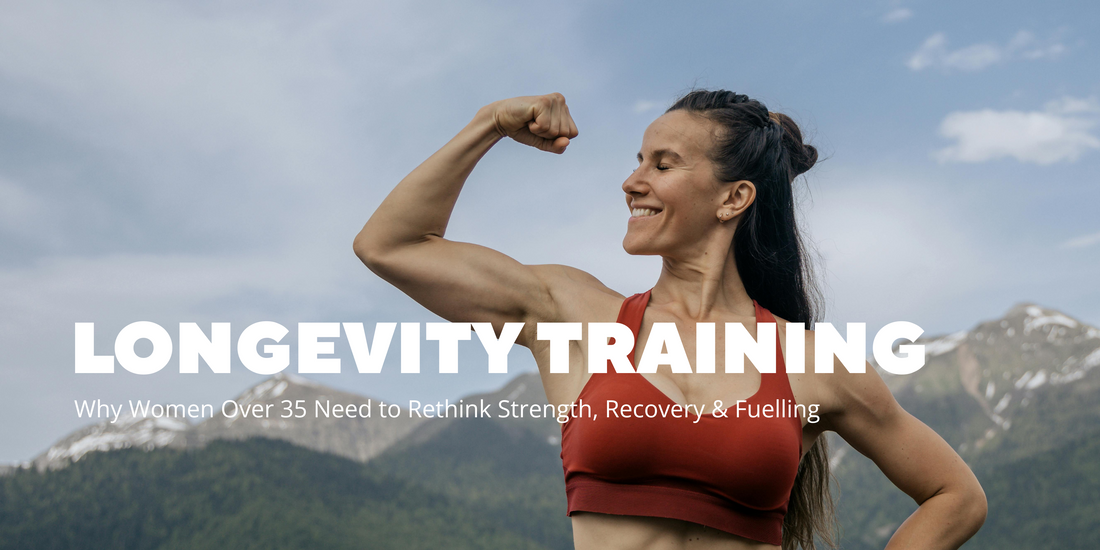
Train for Longevity, Not Burnout: Why Women Over 35 Need to Rethink Strength, Recovery & Fuelling
Share
If you’re a woman over 35 and still trying to follow the “light weights, high reps, cardio to tone” routine—this is your wake-up call.
Because what no one told us in our 20s is that everything changes with age—our hormones, our recovery, our stress tolerance, and most of all, how our body responds to training.
You’re not broken. You’re not lazy. You’re just operating with outdated advice that doesn’t serve you anymore.
Let’s fix that.
Your Muscle Is Your Metabolic Powerhouse
Dr. Gabrielle Lyon founder of the Institute for Muscle-centric Medicine says it best: “Muscle is the organ of longevity.”
It’s not just about looking lean or “toned”—it’s about creating a body that supports you in your 40s, 50s, 60s and beyond. If you’re training for weight loss alone, you're missing the point. Train for longevity and function, and everything else follows.
Muscle helps you regulate blood sugar, protect your bones, manage inflammation, and recover from stress. Lose it, and you lose the ability to age well. That’s not dramatic—it’s physiology.
This is where something called sarcopenia comes in. It’s the age-related loss of muscle mass and strength, and it starts sneaking in around your mid-30s. Left unchecked, it accelerates in menopause and makes everything harder: your metabolism slows, your joints ache, your energy dips, and fat gain gets easier—even if your habits haven’t changed.
But the good news? It’s not inevitable. You can reverse it. You just need to train differently—and eat accordingly.
That means:
-
Being intentional with strength work
-
Prioritizing recovery just as much as intensity
-
Fuelling your body before it runs on empty
When you do this, you not only feel better—you reduce your risk of injury, fatigue, and burnout. You stabilize your hormones. You protect yourself from the downward spiral of sarcopenia. And honestly? You gain the kind of strength that shows up in all areas of life—not just in the gym.
Training Hard Is Great. But Are You Recovering Well Enough to Adapt?
Now we introduce to you, if you haven't already heard of incredible woman, Dr. Stacy Sims. She’s dedicated her career to researching how women’s bodies respond to training across the lifespan. And spoiler alert—our needs are very different from men’s.
Dr Sims found that women have a much shorter window for muscle repair after a workout. While men can rebuild muscle over a 24 to 36-hour period, women get about 30 minutes post-training to stimulate meaningful muscle protein synthesis.
That’s right—30 minutes. That’s your opportunity to signal the body to repair, rebuild, and adapt.
Miss it too often, and your strength gains plateau, your recovery lags, and your fatigue creeps in.
Now, this isn’t about calorie timing for fat loss. This is about cellular signaling—hormones, amino acids, and the nervous system all working together to rebuild you stronger.
Why Most Women Are Undereating Around Their Training
It’s one of the most common things we see in women who train hard but feel flat: they’re underfed, especially around workouts. Not on purpose—but out of habit, misinformation, or being busy.
A coffee before training and “I’ll eat later” doesn’t cut it anymore—not when your hormonal profile is changing and your stress load is higher than ever.
You don’t need to carb-load like an endurance athlete. But you do need some protein and carbs before training—and a complete recovery meal immediately after.
Think: a protein shake and a banana. Eggs and a piece of toast. Greek yogurt with berries.
Whatever it is, just don’t skip it.
You’re not just fuelling for the next session—you’re preserving your muscle, your energy, and your hormonal health. And we understand just how much of a mind f*** this change can be after YEARS of being told otherwise.
You’re Not Failing—You’re Under-supported
So if you’ve been feeling like something’s off, but you can’t quite figure out why—this is your sign.
It’s not about doing more. It’s about doing what works for you.
It’s about understanding your body in this season, not clinging to the rules that worked a decade ago.
Prioritize muscle. Fuel it. Recover like you mean it.
Because training for longevity isn’t extreme—it’s essential.

